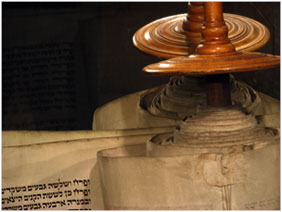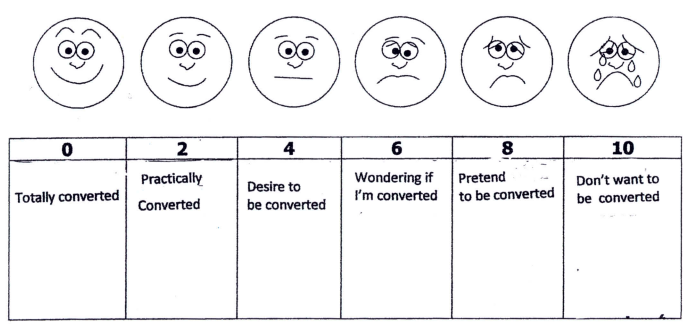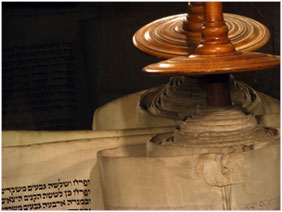-
•
•
61 responses
I thought I would ape this post. Read More
-
•
•
59 responses
I don’t have any statistics for you, just a hunch that we now usually say “the world” where twenty or more years ago we would have said “Satan” or “the devil.” Read More
-
•
•
68 responses
Your latest editorial shows a disturbing lack of integrity. Read More
-
•
•

These chapters are among the most beautiful in the Bible; they are an important part of Western literary culture, even for non-believers. Many scholars see the chapters as part of larger dramatic structure, a larger dramatic script as it were. In contemporary scripts the various parts would be marked clearly: “Chorus,” “Yahweh,” “Earth,” “Heavens,” “Armies,” etc. The fact that we must infer these from what is said makes reading Isaiah more difficult. As I have done with the previous chapters of Isaiah, I’ll outline how the people of Jerusalem might have understood these prophecies. Doing that will help us understand… Read More
-
•
•
54 responses
Most of the commentary that I have read on Elder Packer’s talk (and I have not read widely) treats the decamped rhetorical question as an emotional and political flashpoint. But I think it’s more productively understood as a confounding question of theology, even theodicy. The removal of those nine words from the published version does nothing to resolve the underlying doctrinal problem. First let me say that I understood Elder Packer’s talk to take up implicitly but very clearly the question of the origins of homosexual desire. Others interpret it differently, but that was how I heard it at delivery,… Read More
-
•
•
145 responses
It’s a vexing question, asked frequently and nearly always plaintively. President Boyd K. Packer asked it rhetorically this week, supporting and strongly affirming the church’s stance on sexuality and marriage. He stated: We teach the standard of moral conduct that will protect us from Satan’s many substitutes and counterfeits for marriage. We must understand that any persuasion to enter into any relationship that is not in harmony with the principles of the gospel must be wrong. From The Book of Mormon we learn that wickedness never was happiness. Some suppose that they were pre-set and cannot overcome what they feel… Read More
-
•
•
141 responses

I had a rather formative and utterly unique experience in Elders Quorum a few years ago. I taught the Mother’s Day lesson and at the end, after bearing my testimony, not one soul said “Amen.” Read More
-
•
•
The friends and former students of Professor Richard Lyman Bushman invite submissions for a conference, on the occasion of his 80th birthday, to be held June 18, 2011, at the Springville Art Museum in Springville, Utah. The summer seminars led by Professor Bushman beginning in 1997 pursued the theme of “Joseph Smith and His Times.” Participants were asked to connect the Mormon prophet to the religions, philosophies, and cultural formations of his period. More recently the seminars have posed the same question for Mormonism as a whole. How is Mormon thought to be situated in its broad cultural environment? For… Read More
-
•
•
29 responses

In October a young kid’s fancy swiftly turns to thoughts of treats. With four young kids in our home, you can guess what’s on our minds lately. At our house we celebrate a thoroughly domesticated Halloween, with no concerns about satanism or sugar, just plenty of candy corn and friendly ghosts and homely, homemade costumes. And trick-or-treating. But this year the calendar plays a trick on us: Halloween falls on a Sunday. We observe the Sabbath in a fairly rigorous but, I hope, joyful and worshipful way: we commune at Church, and we rest, read, play, walk, bike, share food… Read More
-
•
•
39 responses
I used to worry that my kids weren’t listening to a word of General Conference. Now I worry that my kids are listening to every single word of General Conference. Read More
-
•
•
One response
T&S does not run open posts — we figure readers ought to be listening to Conference rather than yakking online during the sessions. Instead, we do post-session summaries and posts looking at individual talks. Comments welcome. President Uchtdorf conducted the concluding Sunday afternoon session, featuring talks by Elder Perry, Elder Bednar, Elder Lawrence, three more Seventies, Elder Ballard, and President Monson. Direct quotations (based on my notes) are given in quotes; phrases without quotes are my summary of the remarks given. Parenthetical comments in italics are my own comments. Read More
-
•
•
12 responses
President Uchtdorf conducted the Sunday morning session, featuring talks by President Eyring, Elder Packer, Elder Jensen, Sister Cook, Elder Oaks, and President Monson. Direct quotations (based on my notes) are given in quotes; phrases without quotes are my summary of the remarks given. Parenthetical comments in italics are my own comments. Read More
-
•
•
19 responses
My summary and reaction to the Priesthood Session of General Conference: Elder Nelson: A very nice complement to President Monson’s remarks of the morning session. Elder Nelson focused on missionaries and missionary work, reviewing why we have missionaries and what members should do to forward missionary efforts. He said that the Church has more than 52,000 missionaries serving in 300+ missions. FWIW, the number of missionaries has fallen for most of the past decade (probably due to the decline in the birthrate among members in the U.S.), and the Church has even had to reduce the number of missions as… Read More
-
•
•
4 responses
Notes and reactions to the Saturday Afternoon Session of Conference: Elder Hales: Spoke of sending LDS materials to an old friend and getting a letter back from the friend complaining of terms that he didn’t understand, such as “agency.” Elder Hales said he confirmed that our definition wasn’t in the online dictionary he consulted. He then gave a long description of our beliefs about agency, including the plan of salvation. Told story of being told to varnish a floor and literally “painting himself into a corner.” I’m fascinated by the way that we, Mormons, use terms differently from others. So… Read More
-
•
•
12 responses
The following is my own summary and reactions to the Saturday Morning Session of General Conference. President Monson: Spoke rather briefly. He welcomed everyone to conference and mentioned that 4 Temples were dedicated since the last conference. He then announced plans to construct 5 additional Temples. He also urged members to serve missions, saying that it is an obligation and duty for young men, welcome from young women, and needed from senior couples. Read More
-
•
•
4 responses
I got that familiar little thrill we all feel when one of our favorite hymns is sung in General Conference, as our first session this morning opened with “Let Zion in Her Beauty Rise.” (I was especially happy to have caught it since we experienced significant technical difficulties getting the conference to stream, causing us to miss both the intro and Pres. Monson’s subsequent talk – in eight years of internet streaming conference, I’ve never not had technical troubles, except one time, in the middle of the night, in a smoke filled internet cafe in Alexandria, Egypt). This is one… Read More
-
•
•
12 responses
In this final installment of this month’s series of posts on religion and science, I will present a different take on things from the perspective of a celebrated writer. Marilynne Robinson won a Pulitzer Prize in 2005 for her novel Gilead. She also delivered the Terry Lectures at Yale in 2009, resulting in the book Absence of Mind: The Dispelling of Inwardness from the Modern Myth of the Self (Yale Univ. Press, 2010), from which I draw the following quotations and summaries. Read More
-
•
•
102 responses

Last General Conference Elder Quentin L. Cook suggested that we need to improve the quality of discourse in our country, following the Church’s own statement of almost a year ago. And the suggestion may have drawn some action, since in July the Church-owned Bonneville Media’s radio stations started letting the most egregious of its talk show hosts go, including Sean Hannity. More recently, the Deseret News stopped allowing comments on news story pages and KSL dropped comments altogether on its website, all because of the lack of civil discourse. The overall message seems clear: “Take it down a notch.” Read More
-
•
•
129 responses
This weekend the interweb exploded with a post at Mormon Matters entitled Elder Marlin Jensen Apologizes for Proposition 8. In the ensuing discussion there, and in numerous discussions on Facebook, a debate erupted over whether the headline and the conclusions were warranted, or whether it was being spun into something that could be used by advocates for change. (For a good reflection of what actually happened in the meeting, refer to Carol Lynn Pearson’s comment at Mormon Matters, and her published notes of the account here.) Particularly relevant is that the debate about the tactics used was largely confined to… Read More
-
•
•
26 responses
By Adrienne Cardon [Adrienne sent me the following submission.] I was just a Beehive when those rosy, soft around the edges Homefront commercials rolled out on late-night television. These iconic spots featured families in motion, well-coifed moms and busy pops who metamorphosed from 90’s corporate dads to storyteller/ballplayer dads in 30 seconds. Family, isn’t it about time? asked the ads. They were a bit schmaltzy, they were a bit dewy, they were a bit, well backlit. But here’s much forgotten takeaway – they were effective. This little tagline, this bookend to each commercial was extremely successful. Little by little, public… Read More
-
•
•
3 responses
A new issue of The Mormon Review is available, with James E. Faulconer’s review of Truth and Method by Hans-Georg Gadamer. The article is available at: James E. Faulconer, “Recovering truth: A review of Hans-Georg Gadamer, Truth and Method,” The Mormon Review, vol.2 no. 3. [HTML] [PDF] For more information about MR, please take a look at the prospectus by our editor-in-chief Richard Bushman (”Out of the Best Books: Introducing The Mormon Review,” The Mormon Review, vol.1 no.1 [HTML][PDF]). In addition to our website, you can have The Mormon Review delivered to your inbox. Finally, please consider submitting an article… Read More
-
•
•
9 responses
Consider this editorial in the Deseret News. (I mean it. Follow the link, read the article, and come back.) Intellectually there is quite a bit going on in these paragraphs. First, it is addressing the immigration debate arguing in effect that the rule of law is undermined by both widespread flouting of the laws and attempts to relentlessly enforce laws that are unfair. Both points are well taken in my opinion and in my mind they point toward a policy of better enforcement of considerably more liberal immigration laws, something I would certainly support. The interesting stuff, however, comes in… Read More
-
•
•
82 responses
Elder Dallin H. Oaks spoke recently at Utah’s Constitution Day celebration. His talk, titled “Fundamentals of Our Constitutions,” discussed the role of the constitution, as well as a variety of other topics relating to law, religion, and the public sphere. The talk is well-articulated, as Elder Oaks’ talks tend to be, and sets out some specific ideas about politics which bear further discussion. For the moment, I wanted to focus on one particular portion of the talk. Elder Oaks writes that: Another great fundamental of the United States Constitution is its federal system, which divides government powers between the nation… Read More
-
•
•
55 responses
For a decade we lived in Boca Raton, Florida — a city with a synagogue on every corner where you were much more likely to be invited to a bris or bar/bat mitzvah than any other religious ceremony. Boca had a single ward that varied between fairly thriving (when IBM had a campus there) to barely surviving (when they moved out) and spots in between. But few in the area seemed well-versed in Mormon culture or doctrine. One day I hosted a meeting for the room mothers for oldest daughter’s kindergarten class. When the women walked into the living room,… Read More
-
•
•
38 responses
My five-year-old daughter Alanna started kindergarten a few weeks ago. She’s loving it, and I love getting to talk with her about her day when I get home from work. She shares experiences, sings songs that she learned, shows me her artwork, and tells me about her friends. And she’s started asking questions. That’s great for me, because I can usually answer a five year old’s questions. So it was a big surprise to me last night when, while I was lying in bed getting ready to fall asleep, my wife mentioned, “Alanna asked me today, ‘Why don’t girls get… Read More
-
•
•
37 responses

Perhaps you’re familiar with the Wong-Baker pain chart, used by nurses for assessing pain. It looks like this: Read More
-
Comparative religion, General Doctrine, Latter-day Saint Thought, News and Politics, Philosophy and Theology
•
•
46 responses

Yesterday, I read the following comments on Muslims by an LDS Apostle: I am aware it is not without a great deal of prejudice that we as Europeans, and Americans, and Christians in religion and in our education, so called, have looked down upon the history of Muhammad, or even the name; and even now we may think that Islam, compared with Christianity as it exists in the world, is a kind of heathenism, or something dreadful… Read More
-
•
•

These chapters begin a new section of Isaiah. The first 39 chapters focused on Judah and Israel before the exile in Babylon: the sin and iniquity of Judah and Israel. This section, chapters 40-56, focuses on Judah and Israel during the exile: the promise of return. And the last chapters, 57-66, will focus on Judah and Israel after the exile: life after the return. If we think of these times in Israel’s history as shadows of eternal types, what might we see as their type? Are there other ways of reading the same material, ways of seeing other shadows of… Read More
-
•
•
16 responses
For the next installment in this set of posts, let’s consider the relation between science and religion. In a mildly tedious but well-organized book, When Science Meets Religion: Enemies, Strangers, or Partners? (HarperCollins, 2000), Ian Barbour lays out four basic forms that the relation between science and religion can take: Conflict (either science or religion is correct, but not both); Independence (science and religion refer to different domains or aspects of reality); Dialogue (where discussions about method, metaphysics, and metaphor can enlighten both scientists and theologians); and Integration (natural theology or theology of nature approaches try to unite some or… Read More
-
•
•
24 responses
– – – I saw this photo on Reuters. What struck me most was the head scarf she is wearing. Here is a woman who, by joining the fight against the Taliban, is not rejecting her heritage. She is actively pursuing a new world, but not at the expense of her faith. The war in Afghanistan is often depicted as a war between the “backwards religious” and the “enlightened secular”, as though religious devotion cannot coexist with modern liberal democracy. This woman, by wearing the scarf that symbolizes her faith, defies that too-convenient dichotomy. She demonstrates that the definition of… Read More
